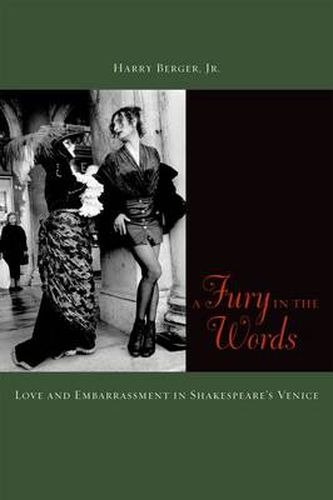Readings Newsletter
Become a Readings Member to make your shopping experience even easier.
Sign in or sign up for free!
You’re not far away from qualifying for FREE standard shipping within Australia
You’ve qualified for FREE standard shipping within Australia
The cart is loading…






Shakespeare’s two Venetian plays are dominated by the discourse of embarrassment. The Merchant of Venice is a comedy of embarrassment, and Othello is a tragedy of embarrassment. This nomenclature is admittedly anachronistic, because the term embarrassment didn’t enter the language until the late seventeenth century.
To embarrass is to make someone feel awkward or uncomfortable, humiliated or ashamed. Such feelings may respond to specific acts of criticism, blame, or accusation. To embarrass is literally to embar : to put up a barrier or deny access. The bar of embarrassment may be raised by unpleasant experiences. It may also be raised when people are denied access to things, persons, and states of being they desire or to which they feel entitled.
The Venetian plays represent embarrassment not merely as a condition but as a weapon and as the wound the weapon inflicts. Characters in The Merchant of Venice and Othello devote their energies to embarrassing one another. But even when the weapon is sheathed, it makes its presence felt, as when Desdemona means to praise Othello and express her love for him: I saw Othello’s visage in his mind (1.3.253). This suggests, among other things, that she didn’t see it in his face.
$9.00 standard shipping within Australia
FREE standard shipping within Australia for orders over $100.00
Express & International shipping calculated at checkout
Shakespeare’s two Venetian plays are dominated by the discourse of embarrassment. The Merchant of Venice is a comedy of embarrassment, and Othello is a tragedy of embarrassment. This nomenclature is admittedly anachronistic, because the term embarrassment didn’t enter the language until the late seventeenth century.
To embarrass is to make someone feel awkward or uncomfortable, humiliated or ashamed. Such feelings may respond to specific acts of criticism, blame, or accusation. To embarrass is literally to embar : to put up a barrier or deny access. The bar of embarrassment may be raised by unpleasant experiences. It may also be raised when people are denied access to things, persons, and states of being they desire or to which they feel entitled.
The Venetian plays represent embarrassment not merely as a condition but as a weapon and as the wound the weapon inflicts. Characters in The Merchant of Venice and Othello devote their energies to embarrassing one another. But even when the weapon is sheathed, it makes its presence felt, as when Desdemona means to praise Othello and express her love for him: I saw Othello’s visage in his mind (1.3.253). This suggests, among other things, that she didn’t see it in his face.